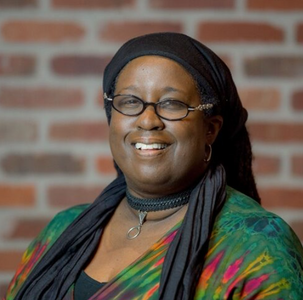Climate justice advocate Jacqueline Patterson delivers annual Stanley Stone Lecture
By Liruoheng (Wendy) Zhang
Climate justice advocate and Boston University alumna Jacqueline Patterson (Wheelock’90) discussed how marginalized communities are disproportionately harmed by environmental issues at the annual Stanley P. Stone Distinguished Lecture, hosted virtually by the College of General Studies on March 21.
“There is so much for us to live on if we live in harmony with each other and with the Earth,” she told the crowd of CGS students and faculty.

Patterson is the Founder and Executive Director of the Chisholm Legacy Project: A Resource Hub for Black Frontline Climate Justice Leadership and former Senior Director of the NAACP Environmental and Climate Justice Program. Since 2007, she has dedicated her career to intersectional approaches to systems change.
Patterson began her lecture on environmental justice with the historical context of the United States. She stated that the founding of the nation was through exploitation of human and natural resources. This extractive economy, an economy dependent on the sale and trade of natural resources, continues today through various policies that benefit multinational corporations, she said.
Because marginalized communities have lower income and less political power than the average American communities, they are more likely to be oppressed by hosting gas or power plant facilities, she said. Furthermore, the same communities are often likely to get their electricity turned off.
Patterson told the story of Navajo communities that live within a 30-mile radius of coal-fired power plants.
“[The Navajo people] were getting all the externalities in terms of pollution from the coal, but not even a resource they were generating in terms of energy,” Patterson said.
Patterson put out a report called “Lights Out in the Cold: Reforming Utility Shut-Off Policies as if Human Rights Matter” after hearing many stories of people who are “paying the price of poverty with their lives” due to unfair electricity shut-offs.
Power plants and electricity are not the only issue that damages marginalized communities, Patterson said. Many communities suffer from being placed near toxic landfills and factory farms, or not having access to safe drinking water and nutritious foods. All these issues have health impacts on the communities.
To make changes, Patterson said we have to recognize the systems and the inequities that are influenced by the “unholy match of money, power, politics, and policies.” She also emphasized the importance of advancing true democracy, voting, and overturning policies that put corporations in power.
Patterson encouraged students to take initiative now. As an advocate, she has published many articles and participated in countless projects, which are all available for people as resources.
The Chisholm Legacy Project, which Patterson founded in 2021, serves as a vehicle to connect Black communities on the frontlines of climate justice with the resources to actualize visions. She believes it is essential to let communities tell their stories from their own perspective. The goal of this project is to provide resources that enable those communities to do so.
“This is why our work is really centered on making sure that frontline communities are not only telling their own stories, but writing their own destiny,” she said.